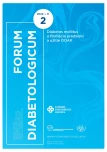Edoxaban in patients with diabetes mellitus and atrial fibrillation
Authors:
Kristína Brisudová; Tomáš Bolek; Matej Samoš; Marián Mokáň
Authors‘ workplace:
I. interná klinika JLF UK a UNM, Martin
Published in:
Forum Diab 2022; 11(2): 98-101
Category:
Overview
The prevalence of atrial fibrillation (AF) and diabetes mellitus (DM) is rising. These chronic conditions can, not unusually, occur simultaneously. DM is an independent risk factor of stroke in patients with AF. Diabetic patients who suffered stroke have higher mortality compared to non-diabetic ones. These patients have larger left atria, and higher risk of left atrial thrombosis. Vitamin K antagonists (VKA) have been traditionally used in diabetic AF patients with good efficacy. However, edoxaban, an oral factor Xa inhibitor, seems to be promising alternative to VKA therapy. Comparing its efficacy in reducing the rate of stroke and systemic embolism, edoxaban was non-inferior to VKA if dosed appropriately. This article summarizes the data about edoxaban therapy in patients with DM and AF.
Keywords:
atrial fibrillation – diabetes mellitus – direct oral anticoagulants – edoxaban
Sources
1. Gage BF, Waterman AD, Shannon W et al. Validation of clinical classification schemes for predicting stroke: results from the National Registry of Atrial Fibrillation. JAMA 2001; 285(22): 2864–2870. Dostupné z DOI: <http://dx.doi.org/10.1001/jama.285.22.2864>.
2. Bandemer SV, Merkel S, Nimako-Doffour A et al. Diabetes and atrial fibrillation: stratification and prevention of stroke risks. EPMA J 2014; 5(1): 17. Dostupné z DOI:<http://dx.doi.org/10.1186/1878–5085–5-17>.
3. Ruff CT, Giugliano RP, Braunwald E et. al. Comparison of the efficacy and safety of new oral anticoagulants with warfarin in patients with atrial fibrillation: a metaanalysis of randomised trials. Lancet 2014; 383(9921): 955–962. Dostupné z DOI:<http://dx.doi.org/10.1016/S0140–6736(13)62343–0>.
4. Wang A, Green JB, Halperin JL et al. Atrial Fibrillation and Diabetes Mellitus: JACC Review Topic of the Week. J Am Coll Cardiol 2019; 74(8): 1107–1115. Dostupné z DOI: <http://dx.doi.org/10.1016/j.jacc.2019.07.020>.
5. Mosher DF. Blood coagulation and fbrinolysis: an overview. Clin Cardiol 1990; 13(4 Suppl 6): VI5–11. 6. Matsushima N, Lee F, Sato T et al. Bioavailability and safety of the factor Xa inhibitor edoxaban and the efects of quinidine in healthy subjects. Clin Pharmacol Drug Dev 2013; 2(4): 358–366. Dostupné z DOI: <http://dx.doi.org/10.1002/cpdd.53>.
7. Mendell J, Lasseter K, Shi M. Effect of esomeprazole on edoxaban pharmacokinetics and pharmacodynamics when administered orally as tablet and as solution. Europace 2011; 13(12). Dostupné z DOI: <https://doi.org/10.1093/europace/eur229>.
8. Bolek T, Samoš M, Korpallová B et al. Eoxaban – metabolizmus, farmakologické vlastnosti a liekové interakcie. Vask Med 2019; 11(1): 26–28.
9. Corsini A, Ferri N, Proietti M et al. Edoxaban and the Issue of Drug-Drug Interactions: From Pharmacology to Clinical Practice. Drugs 2020; 80(11): 1065–1083. Dostupné z DOI:<http://dx.doi.org/10.1007/s40265–020–01328–6>.
10. Olesen JB, Lip GYH, Hansen ML et al. Validation of risk stratification schemes for predicting stroke and thromboembolism in patients with atrial fibrillation:nationwide cohort study. BMJ 2011; 342: d124.Dostupné z DOI: <http://dx.doi.org/10.1136/bmj.d124>.
11. Camm AJ, Kirchhof P, Lip GYH et al. Guidelines for the management of atrial fibrillation: The Task Force for the Management of Atrial Fibrillation of the European Society of Cardiology (ESC). Eur Heart J 2010; 31(19): 2369–2429. Dostupné z DOI:<http://dx.doi.org/10.1093/eurheartj/ehq278>.
12. Pallisgaard JL, Schjerning AM, Lindhardt TB et al. Risk of atrial fibrillation in diabetes mellitus: A nationwide cohort study. Eur J Prev Cardiol 2016; 23(6): 621–627. Dostupné z DOI:<http://dx.doi.org/10.1177/2047487315599892>
13. Haissaguerre M, Jais P, Shah DC et al. Spontaneus initiation of atrial fi brillation by ectopic beats originaiting in the pulmonary veins. N Eng J Med 1998; 339(10): 659–666. Dostupné z DOI:<http://dx.doi.org/10.1056/NEJM199809033391003>.
14. Otake H, Suzuki H, Honda T et al. Influences of autonomic nervous system on atrial arrhythmogenic substrates and the incidence of atrial fibrillation in diabetic heart. Int Heart J 2009; 50(5): 627–641. Dostupné z DOI:<http://dx.doi.org/10.1536/ihj.50.627>.
15. Overvad TF, Skjøth F, Lip GY et al. Duration of diabetes mellitus and risk of thromboembolism and bleeding in atrial fibrillation: nationwide cohort study. Stroke 2015; 46(8): 2168–2174. Dostupné z DOI:<http://dx.doi.org/10.1161/STROKEAHA.115.009371>.
16. Jin H, Zhu K, Wnag L et al. A network meta-analysis of non-vitamin K antagonist oral anticoagulants versus warfarin in patients with atrial fibrillation and diabetes mellitus. Acta Cardiol 2021; 76(9): 960–969. Dostupné z DOI: <http://dx.doi.org/10.1080/00015385.2020.1869671>.
17. Plitt A, Ruff CT, Goudev A et al. Efficacy and safety of edoxaban in patients with diabetes mellitus in the ENGAGE AF-TIMI 48 trial. Int J Cardiol 2020; 304: 185–191. Dostupné z DOI:<http://dx.doi.org/10.1016/j.ijcard.2020.01.009>.
18. Russo V, Attena E, Rago A et al. Clinical Outcome of Edoxaban vs. Vitamin K Antagonists in Patients with Atrial Fibrillation and Diabetes Mellitus: Results from a Multicenter, Propensity-Matched, Real-World Cohort Study. J Clin Med 2020; 9(6): 1621. Dostupné z DOI:<http://dx.doi.org/10.3390/jcm9061621>.
Labels
Diabetology Endocrinology Internal medicineArticle was published in
Forum Diabetologicum

2022 Issue 2
Most read in this issue
- Bleeding in patients on direct oral anticoagulants therapy: diagnostic-therapeutic management
- Laboratory monitoring of the treatment with direct oral anticoagulants
- Rivaroxaban in patients with diabetes mellitus and atrial fibrillation
- Diabetes mellitus and atrial fibrillation
